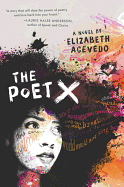
Fifteen-year-old Xiomara Batista is "unhide-able," taller than her father, with what her mother calls "a little too much body for such a young girl." Her struggles are numerous and accessible. She struggles with her parents' religion: "[W]hat's the point of God giving me life/ if I can't live it as my own?" She struggles with street harassment: "It happens when I'm sitting on the stoop./ It happens when I'm turning the corner./ It happens when I forget to be on guard./ It happens all the time." She struggles with boys: "I've been having all these feelings./ Noticing boys more than I used to./ And I get all this attention from guys.../ partly flattered they think I'm attractive,/ partly scared they're only interested in my ass and boobs." Most of all, she struggles with her devout parents, unable to bridge the generational and cultural gap between them. When Xiomara is assigned a biology lab partner named Aman, the "feelings" she's been having surge forward and she tentatively allows herself to take up a little bit more space. This spells serious trouble for X, as Aman calls her, because, "[t]he thing is,/ my old-school/ Dominican parents/ Do. Not. Play." In other words, absolutely no boyfriends until after college.
In her debut novel-in-verse, poet Elizabeth Acevedo (Beastgirl & Other Origin Myths), herself the daughter of Dominican immigrants, takes on the universal push-pull of parents and teens with gritty elegance. Readers will relate to X's frustration over her parents' tight reins on her activities and her longing for the mental, emotional and physical space to discover who she is in her world. The Poet X is beautiful and true--a splendid debut. --Emilie Coulter, freelance writer and editor

